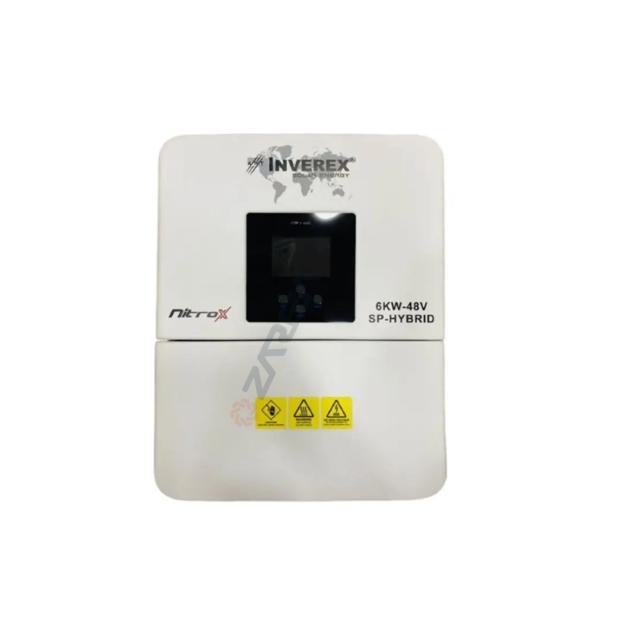Notifications

8 minutes, 29 seconds
-29 Views 0 Comments 0 Likes 0 Reviews

Electricity is no longer just a utility—it's a strategic resource. As power demands grow and sustainability becomes a global priority, solar energy continues to prove its worth as an accessible, clean, and renewable power source. At the core of many efficient solar systems today lies the 6KW 48V hybrid solar inverter—a device that bridges the gap between solar panels, battery storage, and the electricity grid.
This article explores what makes the 6KW 48V hybrid solar inverter such a valuable component in today’s energy systems, its benefits, applications, and how it can elevate the way homes and small businesses manage their power supply.
A hybrid solar inverter is a multi-purpose unit designed to manage various energy sources and regulate power flow between solar panels, batteries, and the grid (or a backup generator). Let’s break down the name:
6KW (Kilowatts): This refers to the inverter’s maximum output capacity. A 6KW inverter can typically handle the energy requirements of a medium-sized household or small business.
48V (Volts): This indicates the voltage of the battery bank it supports. A 48V system is more efficient than lower-voltage systems when managing large power loads.
Hybrid: This term means the inverter is capable of integrating power from multiple sources—solar, battery storage, and the utility grid—while automatically switching between them based on demand.
In essence, this inverter acts as the command center of your solar setup, intelligently deciding when to use solar energy, when to charge or discharge the batteries, and when to draw power from or feed power to the grid.
The inverter’s ability to switch between solar, battery, and grid input ensures that your energy supply remains uninterrupted—even during blackouts or low sunlight periods.
48V systems are known for their electrical efficiency, particularly in systems with higher energy loads. They reduce current levels, which minimizes energy loss and heat build-up in wiring and batteries.
With intelligent energy prioritization, hybrid inverters use solar power first, then battery, and finally the grid—helping reduce your electricity bills while maximizing the use of your renewable energy.
Even in grid-tied configurations, the 6KW hybrid inverter allows you to store excess energy in batteries, ensuring your appliances stay powered during utility outages.
By relying on renewable energy and reducing grid dependency, hybrid solar systems significantly cut greenhouse gas emissions—making them an eco-conscious choice.
Today's hybrid inverters are packed with smart technology that enhances performance and user control:
MPPT Charge Controllers: Ensure that solar panels always operate at their optimal power output.
Remote Monitoring: Access system data via apps or web dashboards to track performance in real time.
Multiple Operating Modes: Set your system to prioritize solar, battery, or grid power depending on time-of-use electricity rates or personal preferences.
High PV Input Range: Allows more solar panels to be connected, increasing overall system flexibility.
Advanced Safety Features: Built-in protections like overload, overcharge, temperature regulation, and short-circuit detection ensure reliable and safe operation.
In a typical household setup, this inverter can power essential devices such as lighting, refrigerators, washing machines, and even air conditioners—either off-grid or connected to the utility grid. It's ideal for homeowners seeking energy independence or wanting to protect against frequent outages.
For areas without access to stable electricity infrastructure, a hybrid inverter ensures continuous energy supply. Paired with batteries and solar panels, it eliminates the need for noisy, fuel-based generators.
Shops, clinics, and offices can keep operations running smoothly, even during grid failures. A hybrid inverter ensures business-critical systems—like point-of-sale machines, computers, and lights—stay operational.
In regions prone to natural disasters or unstable grid conditions, having an intelligent inverter with battery storage offers peace of mind and operational continuity.
Proper installation is essential for safety and performance. Here’s what to consider:
System Design: Ensure your inverter, battery, and solar array are matched in terms of capacity and voltage requirements.
Inverter Placement: Mount the unit in a shaded, dry, and ventilated location to avoid overheating or water damage.
Wiring and Safety: Only qualified professionals should install the system, ensuring compliance with electrical codes and proper grounding.
Regulatory Approvals: Depending on your location, grid-tied systems may require inspection or approval from utility providers.
Though relatively low-maintenance, hybrid inverters do benefit from regular checks:
Inspect Connections: Look for corrosion, loose wires, or signs of wear.
Battery Care: Maintain proper battery health with routine voltage checks and clean terminals.
Software Updates: Some inverters offer OTA (over-the-air) updates to improve functionality and security.
Dusting and Cleaning: Keep vents and fans free of debris to prevent overheating.
A quality inverter can last 10–15 years or more with proper use and care.
With many brands on the market, it’s important to consider:
Warranty and Support: Look for a solid warranty (typically 5–10 years) and accessible technical support.
Brand Reputation: Trusted manufacturers often offer better build quality and firmware reliability.
User Interface: Touch screens, LED displays, or app-based control systems should be user-friendly and informative.
Popular brands include Growatt, Sungrow, Voltronic, Victron Energy, and others, each offering slightly different features tailored to varying needs.
The 6KW 48V hybrid solar inverter represents the next generation of smart energy management. With the ability to blend renewable generation, storage, and grid use into a single, cohesive system, it empowers users with flexibility, control, and peace of mind.
Whether you're a homeowner aiming to cut energy costs, a business looking for reliable backup, or an off-grid enthusiast seeking total independence, a hybrid inverter like this is an essential step toward a more resilient and sustainable energy future.

